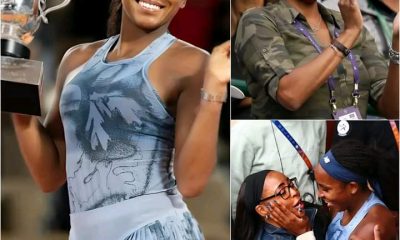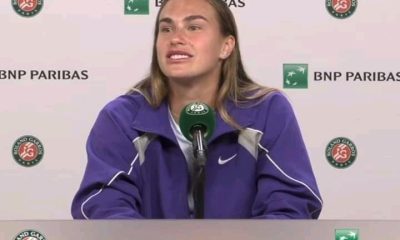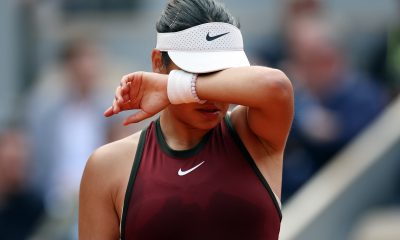Coco Guaff
JUST IN: Coco Gauff Reveal the reasons why Aryna Sabalenka’s Comments After French Open 2025 Match ‘Surprised’ Her due to….

Coco Gauff Reveals Why Sabalenka’s Comments ‘Surprised’ Her After French Open 2025 Final

On June 7, 2025, Coco Gauff made history at Roland-Garros by beating world No. 1 Aryna Sabalenka in a dramatic three-set final (6–7, 6–2, 6–4), becoming the first American woman to win the French Open since Serena Williams in 2015 (people.com).
But it wasn’t just her victory that made headlines this week—it was Sabalenka’s post-match remarks and Gauff’s candid response expressing she was “surprised.” In this feature, we explore:
- What Sabalenka said—and why it stirred controversy
- Gauff’s reaction and emotional response
- The technical, physical, mental, and environmental factors behind those comments
- Broader implications for both players moving forward
- How fans, pundits, and tennis history saw it
Let’s dive deep.
1. The Controversial Post-Match Remarks That Raised Eyebrows
Reactions from the press conference
Immediately after her loss, Sabalenka delivered remarks that caught many off-guard. She downplayed Gauff’s performance, stating she didn’t win because Gauff was extraordinary—but because Sabalenka themselves made a whopping 70 unforced errors, labeling it “the worst final I ever played” (thetennisgazette.com, the-sun.com). Further, she noted that Gauff “didn’t play incredible” and that the windy conditions simply exacerbated her own mistakes (the-sun.com).
Even more eyebrow-raising was her implication that if she hadn’t beaten defending champion Iga Swiatek in the semis, Swiatek might have beaten Gauff in the final. The insinuation: Gauff wouldn’t have won on her own merit (the-sun.com).
A sudden backtrack on Instagram
Shortly after, Sabalenka posted on Instagram, clarifying her position: she praised Gauff’s poise, acknowledged her deserving victory, and owned up to her emotional lack of composure in gusty Paris winds (the-sun.com). Still, the initial statements had already drawn criticism for disrespecting the champion—a softening alone wasn’t enough to erase the shockwaves.
2. Gauff’s Surprised Response on “Good Morning America”
On Good Morning America, Gauff expressed that Sabalenka’s initial comments “surprised” her, but she also acknowledged the emotional immediacy of that moment (people.com).
She offered understanding: “I know emotions may have influenced the remarks,” and recognized that both were battling intense wind and pressure that likely clouded immediate reactions (people.com).
Rather than fueling the controversy, Gauff chose a composed yet assertive tone—accepting Sabalenka’s hurt while maintaining that she earned the win. She also countered Sabalenka’s Swiatek implication, reminding audiences of her straight-sets victory over Swiatek earlier in the tournament (talksport.com).
3. Exploring Why Sabalenka May Have Reacted That Way
Understanding Sabalenka’s mindset requires digging into the technical, emotional, and situational complexities that colored that post‑match moment.
A) The mountain of unforced errors under harsh conditions
- 70+ unforced errors: During the final, Sabalenka produced over 70 unforced errors—a staggering figure in any Grand Slam match (the-sun.com).
- Weather woes: The winds at Roland-Garros were gusty on the final day. Even Gauff acknowledged the conditions posed strategic challenges .
- Self-critical mindset: Having performed well yet still collapsing under pressure, Sabalenka internalized the loss. Saying “I’m not angry with her, I’m angry with myself” reflected an athlete grappling with self-blame, not opponent credit—hence “worst final I ever played” (the-sun.com).
B) Emotional overwhelm and champion’s burden
- No. 1 expectations: As world No. 1, there’s immense pressure. The defeat ended a three-major runner-up streak, adding to frustration .
- Immediate-charged emotion: Post-match adrenaline often fuels impulsive remarks. Sabalenka admitted later that emotion, not character, guided those statements (the-sun.com).
- Historical pattern: Sabalenka has exhibited similar raw emotional reflection in recent years—evidenced by racket-smashing after tough losses (forbes.com).
C) Competitive rivalry with Gauff & Swiatek
- Tough opponent on clay: Sabalenka beat Swiatek in the semis—a major feat (en.wikipedia.org). Claiming “Swiatek would’ve beaten Gauff” hinted at rivalry jostling and latent tension.
- Head-to-head scoreboard: Before Paris, Sabalenka and Gauff were tied 4–4 and had split recent Slam finals (US Open, 2023) (talksport.com). In such a matchup, pride and edge are central, explaining why she might rebound mentally after errors.
D) Historical context of tennis headspace
- Sabalenka’s transformation: She’s grown from outbursts to measured responses post-loss—now her emotional honesty is a reflection of growth.
- Evolving Gauff: Through taking losses like her 2022 French Open final and refining serve mechanics, Gauff demonstrates poetic resilience (theguardian.com).
- Dual narratives: Gauff—strategic, growth-focused, emotionally controlled; Sabalenka—raw, driven, burdened by No. 1 expectations. The irony of Sabalenka’s statements lying in stark contrast to her outward persona is what truly surprised observers.
4. Why Gauff Was Specifically ‘Surprised’
Several factors led Gauff to be surprised rather than upset:
A) Missing expected sportsmanship
Grand Slam finals often conclude with gracious praise from both finalists. But Sabalenka’s initial focus on her faults, rather than Gauff’s strengths, was jarring .
B) Undermining Gauff’s achievement
By implying Swiatek would have beaten Gauff, Sabalenka unintentionally suggested Gauff’s win was not fully earned—contradicting the spirit of fair recognition (the-sun.com).
C) Emotional depth vs. rationality
Gauff was surprised because, as she acknowledged, emotional expression overshadowed rational reflection—highlighting how much the immediate emotional whirlwind influenced Sabalenka .
D) Reinforces her own hard work
Gauff rightly felt that describing the win as a byproduct of opponent mistakes undermined her hard-fought journey through the tournament—something she cemented with poise under pressure .
5. What This Means for Both Athletes Moving Forward
Coco Gauff: Armed with maturity and momentum
- Historical triumph: Her win makes her the first American champion in Paris since 2015 and only the second woman ever to drop the first set in her first two Slams and still win .
- Poise under pressure: Gauff’s composed reply showcased emotional intelligence and confidence in her place atop women’s tennis.
- Next stop: Wimbledon: With grass-court season approaching (starting June 30), Gauff shifts focus but now carries serious title contention after back-to-back major wins (people.com).
Aryna Sabalenka: Reflective reckoning
- Emotional growth: Admitting the comments were a result of emotion shows introspection. The Instagram acknowledgment of Gauff’s talents was a positive step .
- Pressure of No. 1 status: Repeated slam final losses, early-season dips, and expectations weigh heavily. Yet she remains a formidable challenger (forbes.com).
- Revenge tour? The narrative heading into Wimbledon has already intensified—will she channel this as fuel for another major?
6. Fan & Analyst Reactions
From fans & pundits
- Many fan communities felt Sabalenka’s initial words came off as defensive, and questioned the class of attributing defeat to winds rather than giving props.
- Analysts highlighted Gauff’s resilience: her final mental toughness stood in direct contrast to Sabalenka’s emotional breakdown, reinforcing the champion’s maturity (people.com, theguardian.com).
From former pros and coaches
- Rennae Stubbs praised Gauff’s victory as strategic brilliance under wind—but emphasized how Sabalenka’s slip in composure tipped the scales (theaustralian.com.au).
- Sports psychologists suggest No. 1 players often default to self-blame or external excuses. In this case, it was both.
7. Historical Context: A Clash of Generations
Gauff & Sabalenka in the canon
Their rivalry now sits on 5–4 post-French Open. This is their second Grand Slam final showdown—their first since the 2023 US Open, a testament to their dominance .
Maturity vs. rawness
If the future of tennis is defined by composure, psychological resilience, and adaptability, Gauff’s blueprint emerges early. Sabalenka’s emotional transparency might be just as important, but it carries both power and peril.
8. Conclusion: A Moment That Defined Them Both
Sabalenka’s post-match reactions—a mixture of self-blame, blame of winds, and an attempt to minimize Gauff—were a window into the burden of being world No. 1. Gauff, with humanity and confidence, expressed surprise at the rawness and thanked Sabalenka for emotional authenticity, but insisted that the win was hers and hers alone.
As we look ahead to Wimbledon and beyond, this episode has likely forged two paths:
- Gauff, with unwavering belief in herself, is set to carry momentum and perhaps shape a new era of American dominance.
- Sabalenka, challenged by the weight of expectation, may transform this moment into mental renewal—or risk repeating the emotional hold of loss.
Looking Ahead
- Wimbledon launches June 30, and eyes will be on both—will Sabalenka regroup or will Gauff continue her ascent?
- Fan and media narratives will monitor whether this French Open controversy becomes a spark or simply a wrinkle in tennis history.
This was more than just a match—it was a pivotal psychological battle revealed in public. Sabalenka’s candidness, Gauff’s maturity, and what came after form a fascinating chapter in their careers and a vivid snapshot of modern tennis.
-
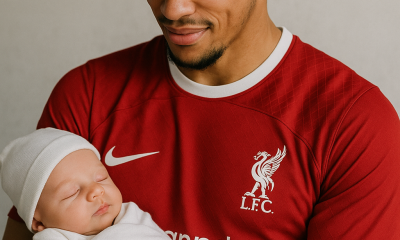
 Liverpool News4 months ago
Liverpool News4 months ago5 Minutes AGO: A Poor Newborn Baby Was Abandoned in a Park Near His Home After The Leicester City Game, in Response To This Heartbreaking Situation, Star Trent Alexander Arnold Stepped In to Become The Child’s Guardian, Pledging To Pay All Living Expenses Until The Child Turns 18….
-
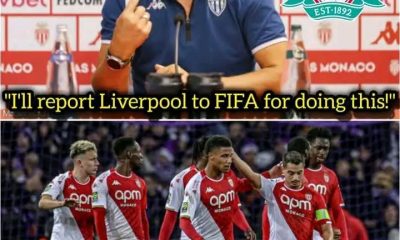
 Liverpool News4 months ago
Liverpool News4 months ago“He visited my office yesterday to inform me about his decision to return to the Anfield this summer. I am not only disappointed in him, but I will also report Liverpool to FIFA for attempting to deceive us.” His return to Liverpool by the summer has been confirmed, but a major issue remains unresolved. HAVING NETTED 15 GOALS IN 6 MATCHES THE MONACO COACH IS DISAPPOINTED IN HIM RETURNING TO LIVERPOOL…..
-

 Liverpool News4 months ago
Liverpool News4 months ago“He Spoke To Me”: Trent Alexander-Arnold breaks Silence on Real Madrid Snub and Finally Reveal The Reason Why He’s Staying at Liverpool After an Advice From….
-

 Liverpool News4 months ago
Liverpool News4 months agoBREAKING NEWS: live from Fabrizio romano, “LET ME GO” Liverpool target set to hand in transfer request to join Liverpool with immediate effect. He said, “I’ve made it clear to the club—I want to leave. The moment I heard Liverpool were interested, my mind was made up. This is a club you don’t say NO to, and I won’t risk waiting around. This is my career, my future, and I’m taking control of it. I’m handing in a transfer request because I want to wear that red shirt. Let me go—this isn’t a request, it’s a warning. My decision is final. It’s Liverpool or nothing.” Yes this is the kind of players we want who want to play for the club and not for the money get him for us immediately the fans are celebrating….
-

 Featured2 months ago
Featured2 months ago🚨𝐄𝐒𝐂𝐋𝐔𝐒𝐈𝐕𝐀: ARDON JASHARI SARÀ UN NUOVO GIOCATORE DEL MILAN! 🚨 ✅ Accordo totale tra Club Brugge e AC Milan per Ardon Jashari! 🔴⚫️ Il trasferimento si chiuderà su una cifra tra i 37 e i 40 milioni di euro, inclusi bonus, oltre a una percentuale sulla futura rivendita. 💼 Contratto fino almeno al 2030, con stipendio stimato tra 2 e 3,5 milioni a stagione 📝 🔥 Ardon Jashari sarà rossonero. Un colpo chiave per il centrocampo del Milan ✅🔴⚫️
-

 Liverpool News4 months ago
Liverpool News4 months agoIT’S FINALLY OFFICIAL:Trent Alexander-Arnold signs a new long-term contract with Liverpool Amid Motivational Goal Scored Against Leicester City, keeping him at the club until 2028….
-

 Featured2 months ago
Featured2 months ago🚨 ULTIM’ORA: CAOS IN SERIE A – La Roma starebbe elaborando un piano terrificante e minaccioso per strappare il difensore brasiliano alla Juventus, ma Tudor ha lanciato un avvertimento chiaro e diretto al club giallorosso, secondo quanto riportano alcune fonti…
-

 Liverpool News5 months ago
Liverpool News5 months agoBREAKING NEWS: Arne Slot Makes Surprise Statement On Trent Alexander-Arnold’s Remaining Games for Liverpool After What Transpired On…



